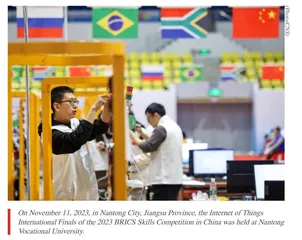BRICS Cooperation: International Institutional Innovation of Multilateral Cooperation in the New Era
作者: Lin Hongyu

The 16th BRICS Summit was held in Kazan, Russia from October 22nd to 24th, 2024, marking the first summit after the BRICS expansion where the BRICS ushered in a new stage of “greater BRICS cooperation”. At present, globalization and global governance are facing grave challenges and international cooperation is taking difficult steps towards high-quality development. Countries, with diverse interests and civilizations and at different stages of development, call for an innovative international institutional arrangement as they aspire to achieve mutual respect and win-win cooperation. The BRICS cooperation is one of such typical paradigms of innovative multilateral cooperation and an international institutional innovation that spearheads the common development of the “Global South”. As the main channel for cementing the solidarity and cooperation of the “Global South” and a vanguard for advancing the reform of global governance, the “greater BRICS cooperation” has profound impacts on the evolution of the international landscape and the transformation of the world order.
China Upgrades and Advances the BRICS Cooperation in the New Era
Since the 18th National Congress of the Communist Party of China, socialism with Chinese characteristics has entered a new era. The “new era” has become a critical coordinate and historical orientation in Chinese modernization. As pointed out by Chinese President Xi Jinping at the opening ceremony of the BRICS Business Forum on the sidelines of the 9th BRICS Summit in 2017, “We should expand the coverage of BRICS cooperation and deliver its benefits to more people. We should promote the ‘BRICS Plus’ cooperation approach and build an open and diversified network of development partnerships to get more emerging market economies and developing countries involved in our concerted endeavors for cooperation and mutual benefits.” His important elaboration on the “BRICS Plus” cooperation model opened up the prospects for acceleration of the BRICS cooperation.
The “BRICS Plus” cooperation model took initial shape as early as March 2013 during the BRICS Summit held in Durban, South Africa. Until the Xiamen Summit, the approaches to implementing the “BRICS Plus” only focused on regional international organizations and regional countries, but failed to demonstrate the aspired positioning of the BRICS cooperation as a global governance mechanism, nor did it live up to the expectations of emerging market economies and developing countries for the BRICS. For the first time ever, the 2017 Xiamen BRICS Summit engaged representatives from emerging market economies and developing countries of different regions in the dialogue, and the “BRICS Plus” mechanism thus truly became an effective platform for the BRICS to carry out open cooperation for mutual benefits and win-win outcomes with other emerging market economies and developing countries. By including more developing countries in the BRICS cooperation, the “BRICS Plus” mechanism has enhanced the representativeness of the BRICS at the geopolitical, economic, and political levels. It has also spread the concept and institutional framework of BRICS cooperation to potential partners, inspiring other countries to approve and adopt a series of political, economic, and cultural standards set up by the BRICS mechanism. In the new era, China has spearheaded the innovation of the “BRICS Plus” mechanism to accelerate the BRICS cooperation and build it into a shining model of innovative multilateral international cooperation, which is demonstrated in three aspects.
The first is to bring together more partners to the BRICS. As the BRICS embrace more friends after the 2017 Xiamen Summit, the grouping has shifted from a regionally representative platform to a globally representative one. During the Xiamen Summit, China, at the presidency, invited leaders from five emerging market economies and developing countries, including Mexico, Egypt, Guinea, Tajikistan and Thailand, to participate in the dialogue for the first time. Such an arrangement is conducive to expanding the coverage of the BRICS, delivering benefits to more partners and thus enhancing the global representation and international discourse power of the BRICS.
The BRICS, represented by China in the new era, take a friendly, open and sincere attitude to engage more emerging market economies and developing countries in the BRICS dialogue and cooperation, and diversify the BRICS partners, in line with the fundamental interests of many developing countries. Engaging in dialogue with the BRICS has become an effective way for developing countries to participate in the global economic development.
The “BRICS Plus” also provides an effective platform for other emerging market economies in the world to intensify cooperation with the BRICS. A group of regional powers are also rapidly emerging and growing with the BRICS. Realizing the weight of the BRICS in major global political and economic affairs, these countries have a strong will to cement closer partnerships with the BRICS and even profoundly participate in the BRICS cooperation. “BRICS Plus” is a design of roadmap for such emerging market economies to gradually engage in the BRICS cooperation and avoid internal divergence within the group of emerging market economies.
The second is to expand the scope of the BRICS cooperation. Driven by the efforts of China, the BRICS cooperation has shifted from the traditional “dual tracks” of economy and politics to the “three main drivers” of political and security cooperation, economic cooperation and people-to-people exchanges. The areas of the BRICS cooperation are more balanced and diverse.
Firstly, efforts are made to intensify political and security cooperation among the BRICS members. Such cooperation, as an important source of solidarity and cohesion of the BRICS and a strong support for trade as well as economic and cultural cooperation among BRICS countries, has been deepened and cemented after the Xiamen Summit. China has actively encouraged BRICS countries to strengthen strategic communication and political mutual trust, leverage on the mechanisms of Meeting of BRICS High Representatives for Security Issues and the Meeting of BRICS Ministers of Foreign Affairs, and bring into full play the role of the BRICS Counter Terrorism Working Group and the BRICS Cybersecurity Working Group in political and security cooperation and thus to strategically build a solid foundation for political and security cooperation.